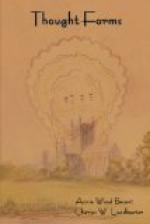[Illustration: FIG. 32. THE GAMBLERS]
The upper form represents a state of mind which is perhaps even more harmful in its effects, for this is the gloating of the successful gambler over his ill-gotten gain. Here the outline is perfectly definite, and the man’s resolution to persist in his evil course is unmistakable. The broad band of orange in the centre shows very clearly that although when the man loses he may curse the inconstancy of fate, when he wins he attributes his success entirely to his own transcendent genius. Probably he has invented some system to which he pins his faith, and of which he is inordinately proud. But it will be noticed that on each side of the orange comes a hard line of selfishness, and we see how this in turn melts into avarice and becomes a mere animal greed of possession, which is also so clearly expressed by the claw-like extremities of the thought-form.
At a Street Accident.—Fig. 33 is instructive as showing the various forms which the same feelings may take in different individuals. These two evidences of emotion were seen simultaneously among the spectators of a street accident—a case in which someone was knocked down and slightly injured by a passing vehicle. The persons who generated these two thought-forms were both animated by affectionate interest in the victim and deep compassion for his suffering, and so their thought-forms exhibited exactly the same colours, although the outlines are absolutely unlike. The one over whom floats that vague sphere of cloud is thinking “Poor fellow, how sad!” while he who gives birth to that sharply-defined disc is already rushing forward to see in what way he can be of assistance. The one is a dreamer, though of acute sensibilities; the other is a man of action.
[Illustration: FIG. 33. AT A STREET ACCIDENT]
At a Funeral.—In Fig. 34 we have an exceedingly striking example of the advantage of knowledge, of the fundamental change produced in the man’s attitude of mind by a clear understanding of the great laws of nature under which we live. Utterly different as they are in every respect of colour and form and meaning, these two thought-forms were seen simultaneously, and they represent two points of view with regard to the same occurrence. They were observed at a funeral, and they exhibit the feelings evoked in the minds of two of the “mourners” by the contemplation of death. The thinkers stood




